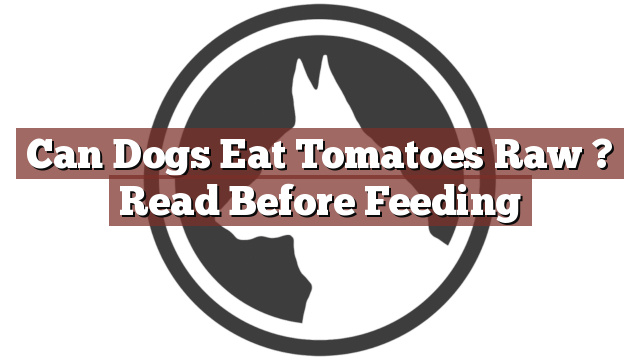Understanding Your Dog’s Dietary Needs
As a responsible pet owner, it is crucial to understand and cater to your dog’s dietary needs. While dogs primarily thrive on a diet of high-quality dog food, it is natural for owners to wonder if other human foods could be safely incorporated into their pet’s diet. However, it is important to remember that not all human foods are suitable for dogs, as their digestive systems differ from ours. It is always recommended to consult with a veterinarian before introducing any new food into your dog’s diet to ensure their safety and well-being.
Can Dogs Eat Tomatoes Raw? Read Before Feeding
Can dogs eat tomatoes raw? This is a common question many dog owners have. The answer is both yes and no, as tomatoes can be safe for dogs when prepared and served correctly. The main concern lies in the stems, leaves, and green unripe tomatoes, which contain a substance called solanine. Solanine can be toxic for dogs and may cause gastrointestinal upset, difficulty breathing, and even cardiac issues. However, ripe tomatoes can be safely consumed by dogs in moderation.
Pros and Cons of Feeding Tomatoes to Dogs
Feeding tomatoes to your dog can have both pros and cons. On the positive side, ripe tomatoes are a great source of vitamins A, C, and K, as well as potassium and fiber. These nutrients can contribute to your dog’s overall health and well-being. Additionally, tomatoes are low in calories, making them a suitable snack for dogs on a controlled diet. However, it is important to keep in mind that tomatoes should only be given as an occasional treat and not as a regular part of your dog’s diet.
On the other hand, the cons of feeding tomatoes to dogs revolve around the potential risks associated with ingesting the stems, leaves, or unripe tomatoes. As mentioned earlier, these parts contain solanine, which can be harmful to dogs. It is essential to remove all stems and leaves and ensure that the tomatoes offered to your dog are fully ripe. It is also advisable to remove the seeds, as they can pose a choking hazard or cause digestive issues in some dogs.
Conclusion: Considerations When Feeding Tomatoes to Your Dog
In conclusion, while tomatoes can be safe for dogs when served correctly, it is important to consider a few factors before feeding them to your furry friend. Always consult with your veterinarian to determine if tomatoes are suitable for your dog based on their individual health needs. When offering tomatoes, make sure they are ripe, remove the stems, leaves, and seeds, and serve them in small, appropriate portions. By taking these precautions, you can provide your dog with a tasty and nutritious treat while ensuring their well-being and health.
Thank you for taking the time to read through our exploration of [page_title]. As every dog lover knows, our furry friends have unique dietary needs and responses, often varying from one canine to another. This is why it's paramount to approach any changes in their diet with caution and knowledge.
Before introducing any new treats or making alterations to your dog's diet based on our insights, it's crucial to consult with a veterinarian about [page_title]. Their expertise ensures that the choices you make are well-suited to your particular pet's health and well-being.
Even seemingly harmless foods can sometimes lead to allergic reactions or digestive issues, which is why monitoring your dog after introducing any new food item is essential.
The content provided here on [page_title] is crafted with care, thorough research, and a genuine love for dogs. Nevertheless, it serves as a general guideline and should not be considered a substitute for professional veterinary advice.
Always prioritize the expert insights of your veterinarian, and remember that the health and happiness of your furry companion come first.
May your journey with your pet continue to be filled with joy, love, and safe culinary adventures. Happy reading, and even happier snacking for your canine friend!

